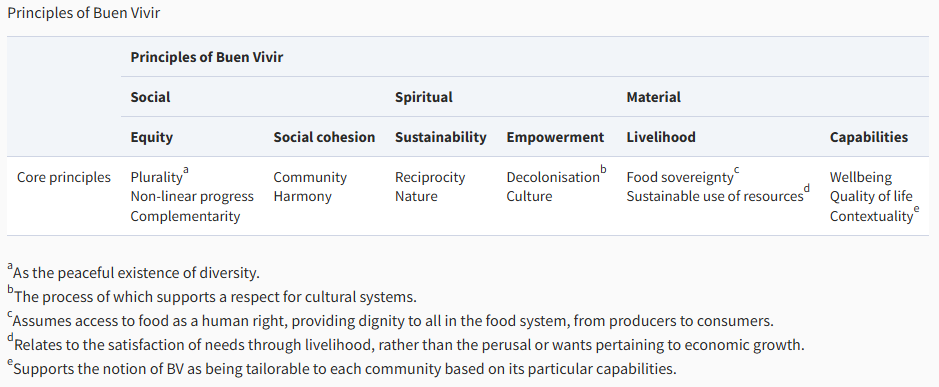Thriving
Cf.
- Sentience
- Ethics
- harmony 1
- good life, buen vivir 2
- flourishing
- Health
- Resilience
- Wellbeing
- prospering
- optimal functioning
- survival
Definitions
Thriving refers to the capacity of organisms, ecosystems, and human communities to maintain a healthy state while expressing their capabilities, growing, reproducing, and remaining resilient against challenges. It includes the wellbeing of all species, including humans, and highlights the importance of equitable and just interactions within ecosystems.
Thriving is as the realization of intrinsic capabilities. Not just survival, but the ability to live well according to one's 'nature'.
Holland, Breena, and Amy Linch. 2016. “Cultivating Human and Non-Human Capabilities for Mutual Flourishing.” In The Oxford Handbook of Environmental Political Theory, edited by Teena Gabrielson, Cheryl Hall, John M. Meyer, and David Schlosberg. Oxford: Oxford University Press.
Schlosberg: humans and nonhuman beings flouring as systems.
Fulfer: the capacity to flourish is sufficient for the inclusion into the sphere of justice.
Challenges
- Sentientist vs biocentric or ecocentric approaches to thriving.
- Capabilities of individuals vs ecosystems. 3
Anthropocentric/Psychological Definition
'Thriving is a psychological state of intellectual, interpersonal and psychological engagement, learning, and growth that is exhibited in high levels of well-being as well as high levels of performance in particular domains.'
Schreiner, Laurie A. 2024. “Thriving.” In Encyclopedia of Heroism Studies, 2058–65. Cham: Springer.
Buen Vivir

Chassagne, Natasha. “Sustaining the ‘Good Life’: Buen Vivir as an Alternative to Sustainable Development.” Community Development Journal 54, no. 3 (2019): 482–500. https://doi.org/10/gdz23m.
Pleasure
Importance of pleasure in animals:
Balcombe, Jonathan P. Pleasurable Kingdom: Animals and the Nature of Feeling Good. London: Macmillan, 2006.
References
Delaney, Tim, and Tim Madigan. (2014) 2021. Beyond Sustainability: A Thriving Environment. 2nd ed. Jefferson: McFarland.
Fair, Hannah, and Matthew McMullen. 2023. “Toward a Theory of Nonhuman Species-Being.” Environmental Humanities 15 (2): 195–214. https://doi.org/10/g9rvdn.
Fulfer, Katy. 2013. “The Capabilities Approach to Justice and the Flourishing of Nonsentient Life.” Ethics and the Environment 18 (1): 19–42. https://doi.org/10/gfsp32.
Johnson, Kira L., Maya K. Gislason, Diego S. Silva, Maxwell J. Smith, and Chris Buse. 2024. “Advancing Planetary Health through Interspecies Justice: A Rapid Review.” Challenges 15 (4): 45. https://doi.org/10/g9rvc9.
Marris, Emma. 2021. Wild Souls: Freedom and Flourishing in the Non-Human World. New York: Bloomsbury.
Robeyns, Ingrid. 2009. “Capability Approach.” In Handbook of Economics and Ethics, edited by Jan Peil and Irene van Staveren, 39–46. Cheltenham: Elgar.
Robeyns, Ingrid. 2017. Wellbeing, Freedom and Social Justice: The Capability Approach Re-Examined. Cambridge: Open Book Publishers.
Footnotes
Washington, Haydn, Erik Gomez-Baggethun, John J. Piccolo, Helen Kopnina, and Heather Alberro. “Harmony in Conservation.” Conservation 2, no. 4 (2022): 682–93. https://doi.org/10/gr5jq7.˄
Gudynas, Eduardo. “Buen Vivir: Today’s Tomorrow.” Development 54, no. 4 (2011): 441–47. https://doi.org/10/fxvz2f.˄
Cripps, Elizabeth. 2010. “Saving the Polar Bear, Saving the World: Can the Capabilities Approach Do Justice to Humans, Animals and Ecosystems?” Res Publica 16 (1): 1–22. https://doi.org/10/frj2kb.˄
Backlinks